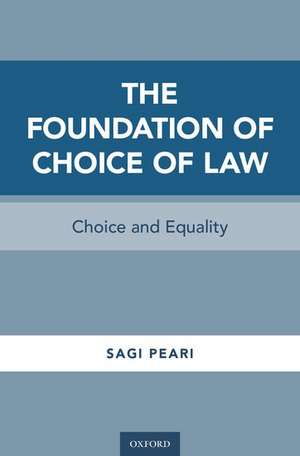The Foundation of Choice of Law: Choice and Equality
Autor Sagi Pearien Limba Engleză Hardback – 31 mai 2018
Preț: 576.27 lei
Preț vechi: 825.36 lei
-30% Nou
Puncte Express: 864
Preț estimativ în valută:
110.27€ • 115.44$ • 91.24£
110.27€ • 115.44$ • 91.24£
Carte tipărită la comandă
Livrare economică 25-31 martie
Preluare comenzi: 021 569.72.76
Specificații
ISBN-13: 9780190622305
ISBN-10: 019062230X
Pagini: 342
Dimensiuni: 239 x 163 x 31 mm
Greutate: 0.59 kg
Editura: Oxford University Press
Colecția OUP USA
Locul publicării:New York, United States
ISBN-10: 019062230X
Pagini: 342
Dimensiuni: 239 x 163 x 31 mm
Greutate: 0.59 kg
Editura: Oxford University Press
Colecția OUP USA
Locul publicării:New York, United States
Recenzii
Written with clarity and panache, based on a firm historical footing but with an eye for the importance of choice of law in the modern age ... Peari has produced a rigorous study of where we are and how we got here, which gives birth to a pragmatic new way of thinking about choice of law in a deeply interconnected, pluralistic, but still troubled world.
Sagi Peari's excellent text, The Foundation of Choice of Law: Choice and Equality ... seeks to establish a theoretically sound, internally consistent, and principled model of choice of law that transcends national boundaries. ... well thought out, engaging, and rigorous.
Peari's account is a tour dhorizon of PIL, spanning the past 200 years of scholarship. He provides comparative insights, including from the most important systems in economic terms: the US, EU, and PRC.
Private international law, long a domain whose doctrinal complexity was not matched by its theoretical sophistication, is increasingly becoming interesting again. The latest proof lies in this book by Sagi Peari. Professor Peari presents no less than a comprehensive new theory of private international law based on a neo-Kantian philosophy of choice and equality. His argument is rigorous, his theory is highly original, and his ideas are controversial-and exciting. They will be widely debated.
Any private international lawyer who wants a theory which is classical and modern, comprehensive and accessible, to explain how the rules for choice of law work (or, sometimes, should work but dont currently work) need look no further than this user-friendly account. How refreshing it is to find a theory derived, in considerable part, from what courts and lawyers spend their days actually doing.
This is an enriching book, full of fresh and compelling insights that should force even the most knowledgeable reader to re-examine certain core assumptions about the philosophical foundations of private international law. It is a welcome contribution to the development of general choice-of-law theory and methodology.
Sagi Peari's book achieves a lot. Engaging, inter alia, with Kant and Savigny on a journey through the stroppy waters of globalization, this study is a work of exceptional clarity and insight. No doubt that the book will make a significant contribution to the discussion about private international laws place in a global context.
Sagi Peari's excellent text, The Foundation of Choice of Law: Choice and Equality ... seeks to establish a theoretically sound, internally consistent, and principled model of choice of law that transcends national boundaries. ... well thought out, engaging, and rigorous.
Peari's account is a tour dhorizon of PIL, spanning the past 200 years of scholarship. He provides comparative insights, including from the most important systems in economic terms: the US, EU, and PRC.
Private international law, long a domain whose doctrinal complexity was not matched by its theoretical sophistication, is increasingly becoming interesting again. The latest proof lies in this book by Sagi Peari. Professor Peari presents no less than a comprehensive new theory of private international law based on a neo-Kantian philosophy of choice and equality. His argument is rigorous, his theory is highly original, and his ideas are controversial-and exciting. They will be widely debated.
Any private international lawyer who wants a theory which is classical and modern, comprehensive and accessible, to explain how the rules for choice of law work (or, sometimes, should work but dont currently work) need look no further than this user-friendly account. How refreshing it is to find a theory derived, in considerable part, from what courts and lawyers spend their days actually doing.
This is an enriching book, full of fresh and compelling insights that should force even the most knowledgeable reader to re-examine certain core assumptions about the philosophical foundations of private international law. It is a welcome contribution to the development of general choice-of-law theory and methodology.
Sagi Peari's book achieves a lot. Engaging, inter alia, with Kant and Savigny on a journey through the stroppy waters of globalization, this study is a work of exceptional clarity and insight. No doubt that the book will make a significant contribution to the discussion about private international laws place in a global context.
Notă biografică
Sagi Peari is a Faculty member of Law School at the University of Western Australia. He researches and teaches within private law, commercial law, international law and their intersections. He has published in leading US, Canadian, European and Australian legal journals. Sagi holds a SJD degree from the University of Toronto, where he held the prestigious Joseph-Armand Bombardier and Connaught Doctoral Fellowships. In addition, he was a recipient of a Hauser Global Scholar Fellowship at New York University, a Connection Grant from the Social Sciences and Humanities Research Council of Canada, and has been recognised for his academic contribution by the American Society of International Law.
